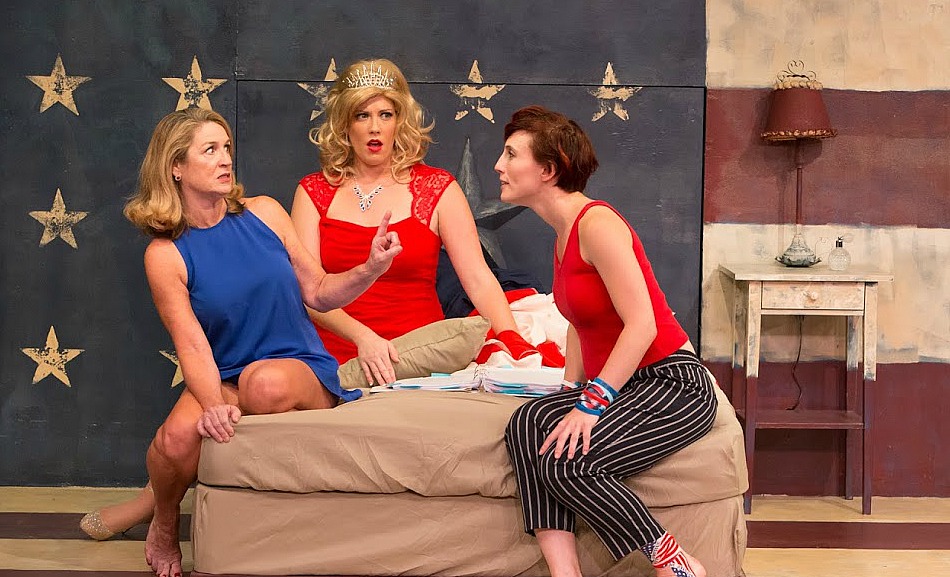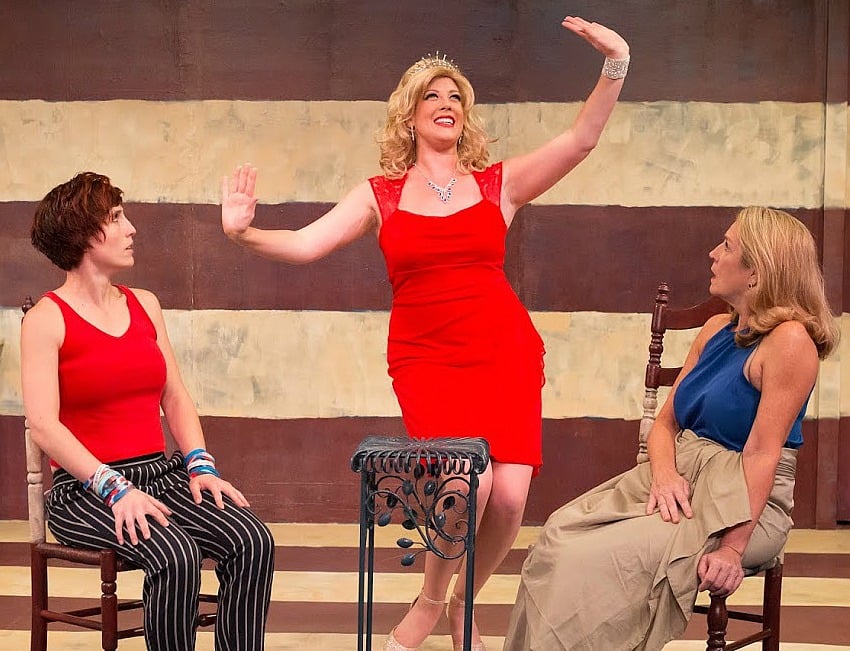Review: ‘The Taming’ At Circle Theater
ArtandSeek.net August 26, 2016 34‘The Taming’ is the title of a political comedy at Circle Theatre that encompasses both today’s partisan gridlock and the Constitutional Convention of 1787. It does all this with three women playing all the roles, including a very sassy George Washington. Local All Things Considered host Justin Martin sat down with Art & Seek’s Jerome Weeks to find the humor in our history and politics.
Justin: So Jerome, knowing the title, ‘The Taming’ and knowing the play’s been described as a feminist comedy, I figured it’d be like a role reversal on Shakespeare’s ‘Taming of the Shrew.’
Instead, ‘The Taming’ is a political satire, very timely, about our current political stalemate. It puts all our partisan rancor into three people in one hotel room. There’s a conservative political operative, there’s a liberal blogger-activist and there’s a cheerful Miss America contestant – Miss Georgia. She drugged the other two and has trapped them here.
But why??

Politics makes strange bedfellows: Lisa Fairchild, LIz Millea and Lauren Ferebee in ‘The Taming’ at Circle Theatre. Photos: TayStan Photography.
Ohhhhhh. Is that the one that says the states can vote to start a convention? If there’s a majority, they can write a new Constitution?
Is that what Miss Georgia wants to do?
Bianca [Ferebee]: Oh, if I say it loud it enough, it must be true.
Patricia [Lisa Fairchild}: Ohhhhh, if I cry, it must be helpful.
Bianca: Oh, if I say ‘main street’ enough, people will think I care about the poor.
Patricia: Oh, if I drain the national defense and pour it into symphonies, no one will ever attack us again.
Bianca: Who are you?
Patricia: Who are you?
Bianca: I’m a proud liberal patriot.
Patricia: That’s not a real thing.
Bianca: Neither is a gay Republican.
Oooh. Some of that’s sharp.
But what are these two doing in the hotel room?
George Washington [Liz Millea]: I’m presiding over your convention, like you asked me to, you’re welcome. And it is hot in Philadelphia and we are a smelly and loud-talking bunch, so we gotta wrap this up, OK?
James Madison [Lisa Fairchild]: Yes, Mr. President!
George Washington: Not president yet but I appreciate your future vote I’m George Washington.
Well, it certainly doesn’t sound as bitter.
For instance: It initially seemed odd to me that Gunderson includes a note in the program about ‘feminist humor’ — she knowingly mocks the old canard that feminists have no humor. (Molly Ivins, Ann Richards, hello?) It initially seemed odd because, in Bianca, Gunderson has created the very model of a rigid, unforgiving, humorless feminist. But then, that would seem to be the point: Gunderson is mocking what, presumably, are some of her own political beliefs by making them extreme and ridiculous: Bianca is willing to scuttle an entire employment bill because one provision in it will endanger the future of the ‘panda shrew’ (another nod to Shakespeare), an animal so obscure and small no one else has even heard of it let alone seen one.
On a certain plane, the satire is even admirable and honest. But Bianca is still a humorless feminist. Meaning she’s an annoying, mostly one-note caricature we endure. And like all good ‘Occupy Wall Street’-style liberals, it seems, she seems so idealistic as to be nearly useless in ordinary political maneuvering. So she resorts to (illegal) extremes.
The conservative Patricia, on the other hand — at least as portrayed by the capable Lisa Fairchild — may be willing to defend the indefensible (her senator-employer, who has a thing for young interns). But she’s actually quite smart, apparently effective in her job as a dim-bulb senator-wrangler and — if push came to kidnapping — would be a more congenial person to be trapped in a hotel room with. She’s the conservative-as-knowledgeable-insider and string-puller.
She is not, in other words, a tea party extremist, unwilling to compromise on anything, perfectly happy to lose an election or wreck a political party or the entire government just to uphold her ideals. It’s a stance that’s been called “political nihilism” even by fellow Republicans. In this light, it’s worth pointing out that it’s Bianca who threatens the most extreme method to achieve her political ends, not Patricia.
So the political satire in ‘The Taming’ seems another case of the ‘false equivalency’ — calling for a pox on both sides when both sides aren’t really equally destructive here.

The pageant judges will love my talent portion: Ferebee, Millea and Fairchild in ‘The Taming.’
What also initially seemed odd about Gunderson’s note about feminist humor is that feminism really isn’t a major point of contention between the two politicos. Patricia defends herself, for instance, by saying she, too, had to break down the doors of the ‘old boys’ club’ to get where she is in the Republican Party. So don’t give her any whiny guff about glass ceilings.
But of course, while Patricia’s achievement may well be an example of feminism-at-work, Patricia herself will never see it that way: Her success did not depend on the earlier victories of the women’s movement but from her own determination, skill and hard work. She’s the classic ‘self-made woman’ who’s blind to how much of a boost she actually got. But there is no counter to her declaration of self-reliance in the play; it’s another case of while Bianca is shrill and driven to extremes, Patricia comes across as hard-headed and practical. Who you gonna admire? Who’d you want to run a government?
Yet ‘The Taming’ is still a feminist comedy simply because there are only women in it. Only women debate power and attempt to exercise (different types of) power here. Gunderson’s unstated-but-still-very-much-present argument is that, if women were in charge and were given a chance to re-write a founding document in which they had no initial input, they could get some serious things squared away. Mistakes would be corrected, intelligent compromise could happen again, government could be effective and beneficial and representative, etc.
Except Gunderson herself also recognizes the weakness behind the widely-held public belief that ‘if only our elected officials would compromise instead of sticking to their parties’ most extreme platform planks, America could function again.’ For one thing, she recognizes (but also seems to ignore) the fact that American government is, in its essence, divided. Internal conflict and maddening cross-purposes among the three branches of government are this country’s normal mode of being.
But the playwright’s bravest moment comes when ‘The Taming’ slams right into the ugliest compromise Americans ever made. The 1787 Constitutional Convention compromised and truly created the United States. In fact, they agreed on a divided system of government that’s supposed to encourage compromise (and stifle popular flare-ups of the more extreme, dangerous and fleeting variety).
But in 1787, in order to keep the Southern states in the Union, we also compromised and agreed to let slavery continue. We sold out the African-Americans (and not for the last time).
Gunderson has the historical wisdom to recognize this. She has James Madison (in the dream form of Patricia) agonize over slavery — and then broker the deal. So our current Holy Grail of compromise can turn out to be evil. And while her female characters at the end may agree on a roster of seemingly non-controversial proposals (reforming redistricting, abolishing the electoral college, balancing the budget), they don’t address, oh, say, reparations for slavery. Or government-funded abortions as part of a universal healthcare program. Good luck getting Americans to agree on those.
Yes, ‘The Taming’ is a comedy and it only has two acts. It’s not about solving everything wrong with America. But while I admire the play’s intelligence and occasional slashes of wit, its cockamamie premise (kidnapping people to jump-start a new Constitutional Convention) gives it the freedom to do something like flashback to 1787 and re-arrange history a bit, but not enough to think clearly (and perhaps scathingly) about our future.
One more note. Rose Pearson, who co-founded Circle Theater 35 years ago, died of cancer the day before ‘The Taming’ opened. ‘The Taming’ reflects Pearson’s best impulses in starting Circle and keeping it going. It’s a new play, it’s a thought-provoking play and, thanks to director Robin Armstrong, it’s been given a smart production. Here’s hoping this legacy, Pearson’s legacy, continues at Circle.











